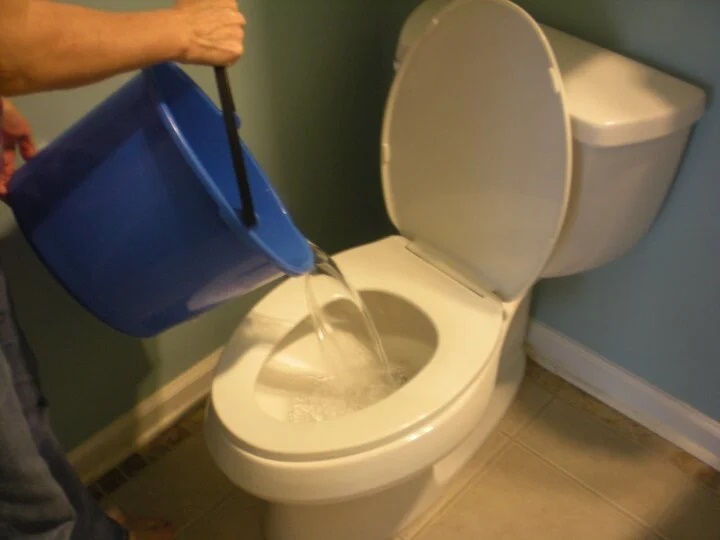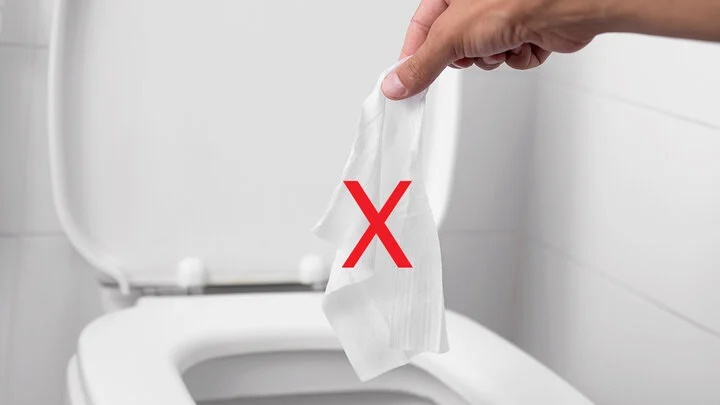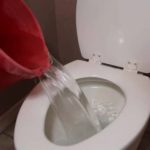In order to save water to the maximum extent, many people reserve domestic wastewater (wastewater after washing, bathing, rinsing vegetables, dishwashing, etc.) to flush the toilet after going to the bathroom. However, this is a harmful habit and should be abandoned.
Why shouldn’t you pour domestic wastewater into the toilet?
According to Sohu, pouring domestic wastewater into the toilet will have the following serious consequences.
Cause sewer blockage
Domestic wastewater can contain a large amount of impurities and waste materials, which will accumulate in the toilet and sewer, causing poor water flow or even complete blockage.

Why shouldn’t you pour domestic wastewater into the toilet? Because this type of water can damage the toilet and drainage system. (Image: Gotta Wanna Needa Getta Prepared)
Spread bacteria
Domestic wastewater can contain a large number of bacteria and viruses. When used to flush the toilet, bacteria and viruses can spread into the air and cause pollution, adversely affecting health.
Damage the toilet and drainage system
Domestic wastewater can contain chemicals that are harmful to the toilet and drainage system. Using it to flush the toilet for a long time can damage the toilet and drainage system, increasing repair costs.
Although domestic wastewater can wash away dirt in the toilet, its impact is much weaker compared to clean water, which significantly reduces the cleaning efficiency, sometimes causing the inside of the toilet bowl to become yellow or stubborn stains that cannot be completely removed. That is why you shouldn’t pour domestic wastewater into the toilet.
Things you should never flush down the toilet
Many people treat the toilet as a trash can and dispose of waste by throwing it in and flushing it. Flushing garbage into the toilet not only causes pipe blockage but can also spread diseases. Here are things you should never throw into the toilet:
Wet wipes
Many people think that wet wipes are similar to regular tissues and will disintegrate after being flushed down the toilet. In reality, they will remain intact in the sewer system and persist in water sources. And they can easily cause pipe blockage.

Discarding wet wipes in the toilet is the cause of pipe blockage. (Image: Choice)
Expired medication
Many people are afraid that young children may tamper with expired medication, so they flush it down the toilet instead of throwing it in the trash. However, this behavior can be harmful to the community. The New York State Department of Environmental Conservation advises that the substances in antidepressants, hormones, antibiotics, and other medicines may not change after the wastewater treatment process and enter rivers and other water sources. They will pollute drinking water sources downstream and may harm fish or other organisms.
Cotton pads
Cotton pads may look similar to tissues, but their reaction after being flushed down the toilet is very different from tissues. Think about why we use cotton pads to apply pressure to wounds after injections? It’s because cotton pads have the ability to absorb liquids and are not dissolved by water. The cotton will expand when in contact with water, causing clogs in the drainage pipes.
Hair
Those who have pulled a bunch of hair out of a clogged bathroom drain or sink will know what it can do to the drainage system. When strands of hair get tangled together, they are not easily carried away by water.
Cat feces or litter
Never flush cat feces or litter down the toilet. Cat litter will expand when in contact with water and clog the drainage pipes. Moreover, cat feces may contain the Toxoplasma gondii parasite, which can be harmful to humans or aquatic organisms when released into the environment.
Leftover food
Some people have the habit of dumping leftover food into the toilet to reduce the hassle of throwing away trash. This is also a common cause of pipe blockage in the water and toilet system. Although they may decompose, it takes a long time.
Sanitary napkins
Sanitary napkins are very friendly to women but quite “cruel” to the sewer system. Regularly disposing of sanitary napkins in the toilet will cause a disaster for the drainage system. Additionally, other products such as condoms, panty liners, etc., should also not be flushed into the toilet.
According to VTC news

































